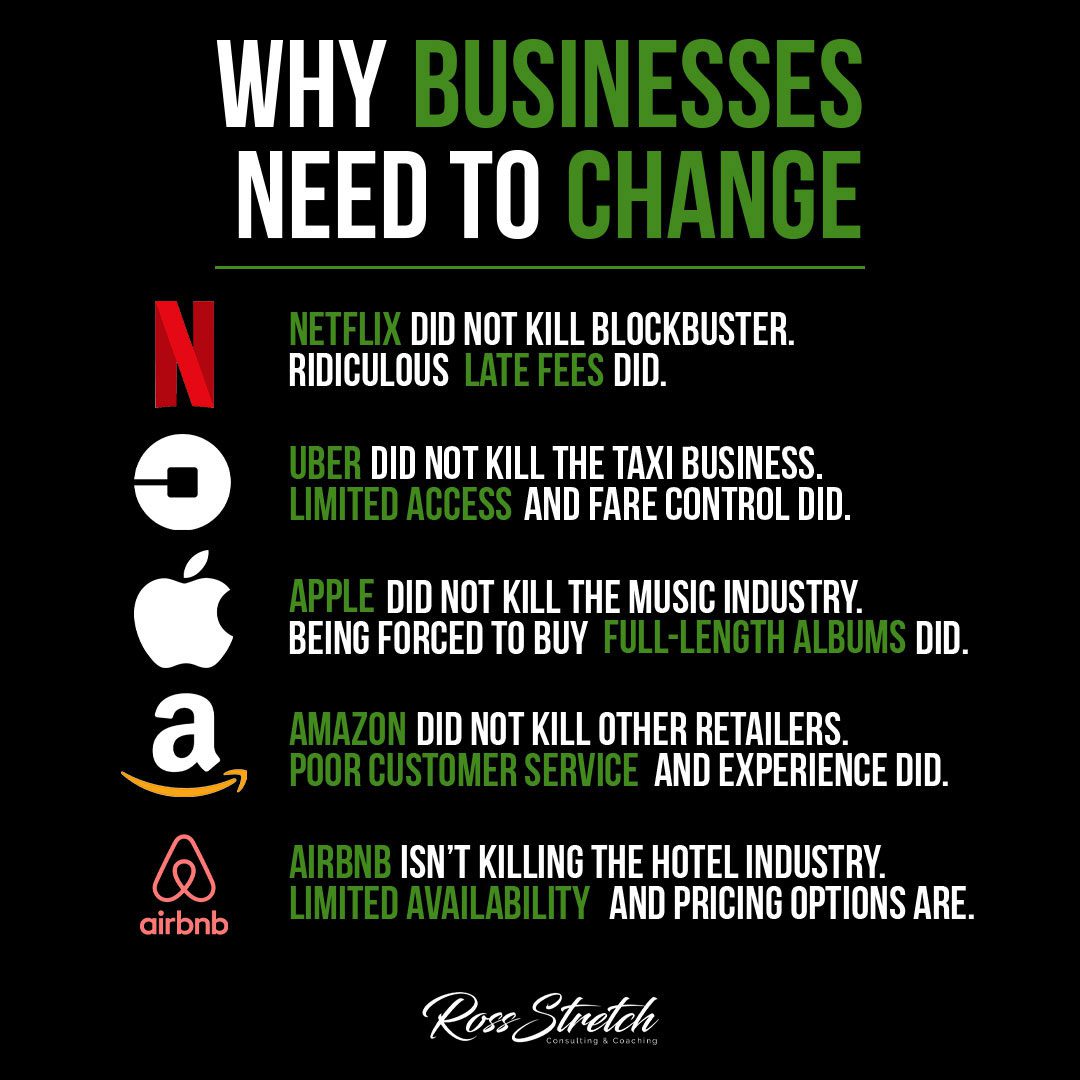Introduction:
In today’s rapidly evolving business landscape, the ability to adapt and embrace change is essential for long-term success. As technology advances and consumer preferences shift, businesses must recognize the need for change to remain competitive. In this article, we explore compelling examples that illustrate why businesses need to adapt and the key factors that contribute to their success.
To remain relevant and successful, businesses must prioritize innovation, customer-centric, and adaptability.
Ross Stretch
Netflix Did Not Kill Blockbuster. Ridiculous Late Fees Did:
The rise of streaming services revolutionized the entertainment industry, and Blockbuster failed to adapt. Consider the following points:
- Customer-centric approach: Netflix recognized the inconvenience and frustration caused by late fees, offering a seamless streaming experience that prioritized customer satisfaction.
- Embrace digital transformation: Blockbuster’s reluctance to adopt digital platforms and embrace online streaming contributed to its downfall.
Uber Did Not Kill the Taxi Business.
Limited Access and Fare Control Did: Uber disrupted the transportation industry by addressing customer pain points. Consider the following factors:
- Enhanced accessibility: Uber offered a user-friendly app, convenient booking, and simplified payment methods, providing a superior customer experience.
- Fair pricing: Traditional taxi services often faced criticism for inconsistent pricing models and lack of transparency, while Uber introduced upfront pricing and eliminated meter-related concerns.
Apple Did Not Kill the Music Industry. Being Forced to Buy Full-Length Albums Did:
Apple’s iTunes and later, streaming services, transformed how music is consumed. Consider the following aspects:
- Digital music revolution: Apple’s iTunes Store introduced the concept of purchasing individual songs, liberating consumers from having to buy full-length albums.
- Adapt to consumer preferences: Streaming services like Spotify and Apple Music catered to consumers’ desire for personalized music experiences and on-demand access.
Airbnb Isn’t Killing the Hotel Industry. Limited Availability and Pricing Options Are:
Airbnb disrupted the hospitality industry by offering unique accommodation experiences. Consider the following factors:
- Diverse options: Airbnb provided a wide range of accommodation choices, including private homes and unique properties not typically found in traditional hotels.
- Flexible pricing: Airbnb’s dynamic pricing allowed hosts to adjust rates based on demand, providing competitive pricing options for travelers.
Embracing Change for Business Success:
To thrive in today’s dynamic market, businesses must embrace change and adapt their strategies. Consider the following key points:
Embrace Innovation:
- Encourage a culture of innovation: Foster an environment that encourages employees to explore new ideas, experiment, and challenge the status quo.
- Stay updated on industry trends: Keep a pulse on technological advancements, emerging consumer behaviors, and market dynamics to identify opportunities for innovation.
Customer-Centric Approaches:
- Understand customer needs: Conduct market research, gather feedback, and actively listen to customers to understand their evolving preferences and expectations.
- Personalize the customer experience: Use data-driven insights to deliver tailored products, services, and experiences that resonate with customers.
Adaptability:
- Agility in decision-making: Be open to change and quick to respond to market shifts, adjusting strategies and operations accordingly.
- Foster a learning culture: Encourage continuous learning, provide training opportunities, and empower employees to adapt and embrace new ways of working.
Conclusion:
The examples of Netflix, Uber, Apple, and Airbnb demonstrate the significance of embracing change in today’s business landscape. To remain relevant and successful, businesses must prioritize innovation, customer-centric, and adaptability. By recognizing the need for change and adopting a proactive mindset, organizations can position themselves for long-term success in an ever-evolving market.
References:
- Duhigg, C. (2012). The Power of Habit: Why We Do What We Do in Life and Business. Random House.
- Christensen, C. M., Raynor, M. E., & McDonald, R. (2015). Disruptive innovation. Harvard Business Review, 93(12), 44-53.
- Osterwalder, A., & Pigneur, Y. (2010). Business model generation: a handbook for visionaries, game changers, and challengers. John Wiley & Sons.


